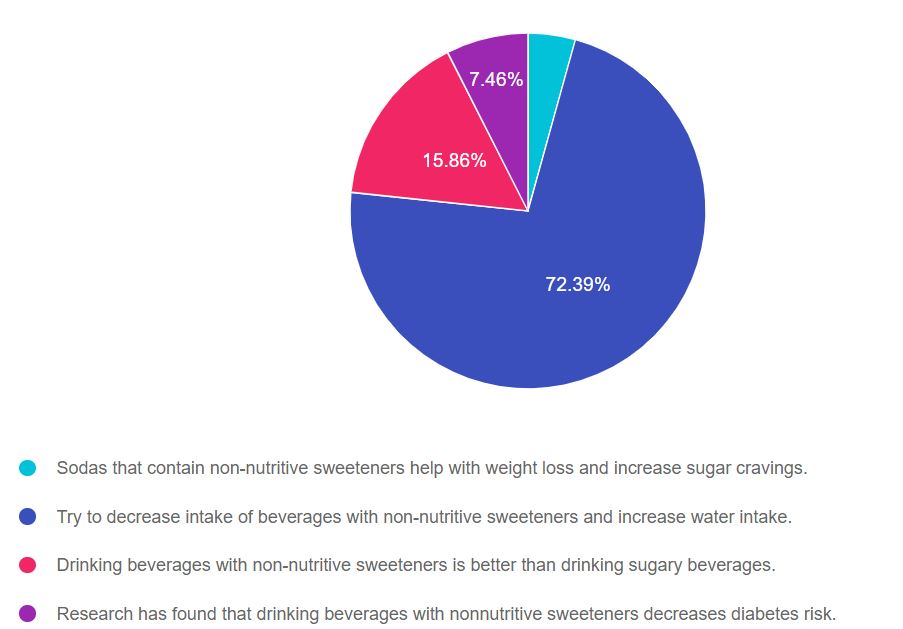
For our July 27th Question of the Week, 72% of respondents chose the best answer. GREAT JOB! We want to “take a closer look” at this question and determine strategies to choose the best response.
Before we start though, if you don’t want any spoilers and haven’t tried the question yet, you can answer below: Answer Question
Question 1: JR has type 2 diabetes and is trying to lose weight by eating less and moving more. JR asks your advice about drinking diet sodas.
Based on the recommendations in the ADA Standards of Care, what is the best response?
Answer Choices:
- Sodas that contain non-nutritive sweeteners help with weight loss and increase sugar cravings.
- Try to decrease intake of beverages with non-nutritive sweeteners and increase water intake.
- Drinking beverages with non-nutritive sweeteners is better than drinking sugary beverages.
- Research has found that drinking beverages with nonnutritive sweeteners decreases diabetes risk.

As shown above, the most common choice was option 2, the second most common answer was option 3, then option 4, and finally option 1.
Getting to the Best Answer
If you are thinking about taking the certification exam, the content of this practice test question will set you up for success. Since medical nutrition therapy (MNT) is an integral part of providing diabetes care, regardless of profession, it will be helpful to be familiar with the MNT guidelines in the ADA Standards of Care 5. Thanks much, Coach Beverly
Answers & Rationale
Answer 1 is incorrect, 4.29% chose this answer, “Sodas that contain non-nutritive sweeteners help with weight loss and increase sugar cravings.” According to the ADA “The addition of nonnutritive sweeteners to diets poses no benefit for weight loss or reduced weight gain without energy restriction.” The ADA Standards makes no comment on sugar cravings associated with non-nutritive sweeteners, so the first and second part of this answer are not based on evidence, which makes this answer false.
Answer 2 is correct, 72.39% of you chose this answer, “Try to decrease intake of beverages with non-nutritive sweeteners and increase water intake.” Yes, this is the best evidence based recommendation for fluid intake, health and diabetes management. I recommend flavored sparkly waters or adding a slice of cucumber, lemon or a fresh strawberry to your glass of H2O and calling it spa water.
Answer 3 is incorrect, 15.86% of you chose this juicy answer, “Drinking beverages with non-nutritive sweeteners is better than drinking sugary beverages.” According to the ADA Standards, “some people with diabetes who are accustomed to regularly consuming sugar-sweetened products, nonnutritive sweeteners (containing few or no calories) may be an acceptable substitute for nutritive sweeteners (those containing calories, such as sugar, honey, and agave syrup) when consumed in moderation.” Clearly, the ADA Standards do not say that beverages with non-nutritive sweeteners are better than sugary beverages, so this answer is juicy answer is false.
Answer 4 is incorrect, 7.46% of you chose this answer “Research has found that drinking beverages with nonnutritive sweeteners decreases diabetes risk.” According to the ADA, some research has found that higher nonnutritive-sweetened beverage and sugar-sweetened beverage consumption may be positively associated with the development of type 2 diabetes.”
We hope you appreciate this week’s rationale! Thank you so much for taking the time to answer our Question of the Week and participate in this fun learning activity!
Want to learn more about this topic?
Enroll in our Virtual DiabetesEd Specialist Program!
Medical Nutrition Therapy + Meal Planning + Exercise with Guest Speaker Ashley LaBrier | 4 CEs

These courses with Ashley LaBrier, MS, RD, CDCES who is passionate about providing person-centered education to empower those who live with diabetes. Having been diagnosed with type 1 diabetes herself nearly 20 years ago, she combines her professional knowledge with personal experience and understanding.
These courses review the latest national nutrition guidelines and provide strategies to translate this information to an individual living with diabetes. Included is a discussion on different approaches to meal planning and the benefits and limitations of each, meal planning, and the importance of activity with nutrition.
Topics include:
- Medical Nutrition Therapy Updates and Critical Content
- Describe person-centered nutrition issues based on assessment and clinic data.
- Explore national guidelines for medical nutrition therapy and how to individualize interventions from a person-centered perspective.
- State how to customize nutritional approaches in people living with complications of diabetes.
- How to Eat by the Numbers and Meal Planning Approaches
- Describe the impact of micro and macronutrients on health.
- List different meal planning approaches and the pros and cons of each.
- Describe how to help people with diabetes to read labels and be thoughtful consumers.
- Keeping Well Through Activity and Nutrition
- Describe activity benefits, precautions, and recommendations
See Full Calendar for upcoming webinars and Virtual Courses.
Can’t make it live? All paid registrants are guaranteed access to the video presentation, handouts and podcasts.
Sign up for Diabetes Blog Bytes – we post one daily Blog Byte from Monday to Friday. And of course, Tuesday is our Question of the Week. It’s Informative and FREE! Sign up below!
[yikes-mailchimp form=”1″]Accreditation: Diabetes Education Services is an approved provider by the California Board of Registered Nursing, Provider 12640, and Commission on Dietetic Registration (CDR), Provider DI002. Since these programs are approved by the CDR it satisfies the CE requirements for the CDCES regardless of your profession.*
The use of DES products does not guarantee the successful passage of the CDCES exam. CBDCE does not endorse any preparatory or review materials for the CDCES exam, except for those published by CBDCE.









